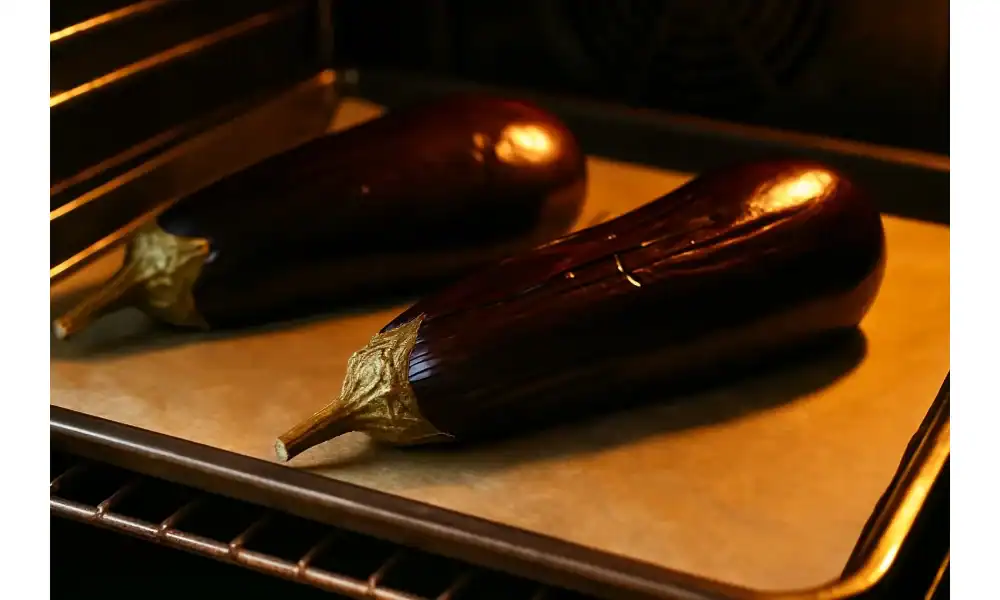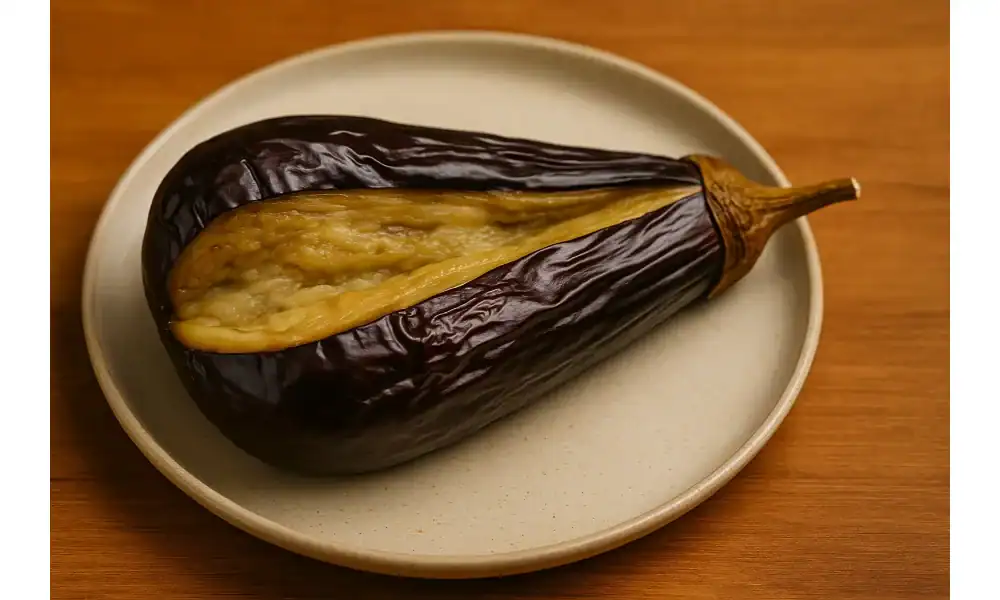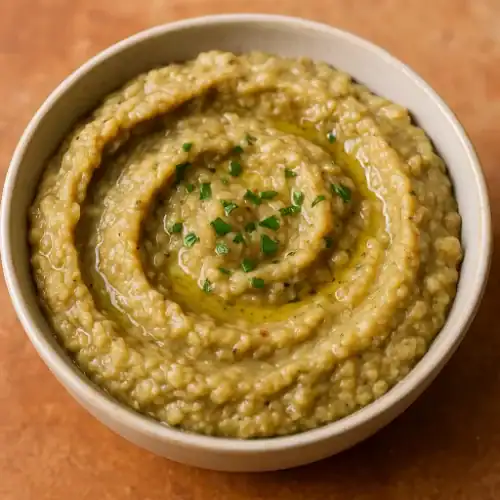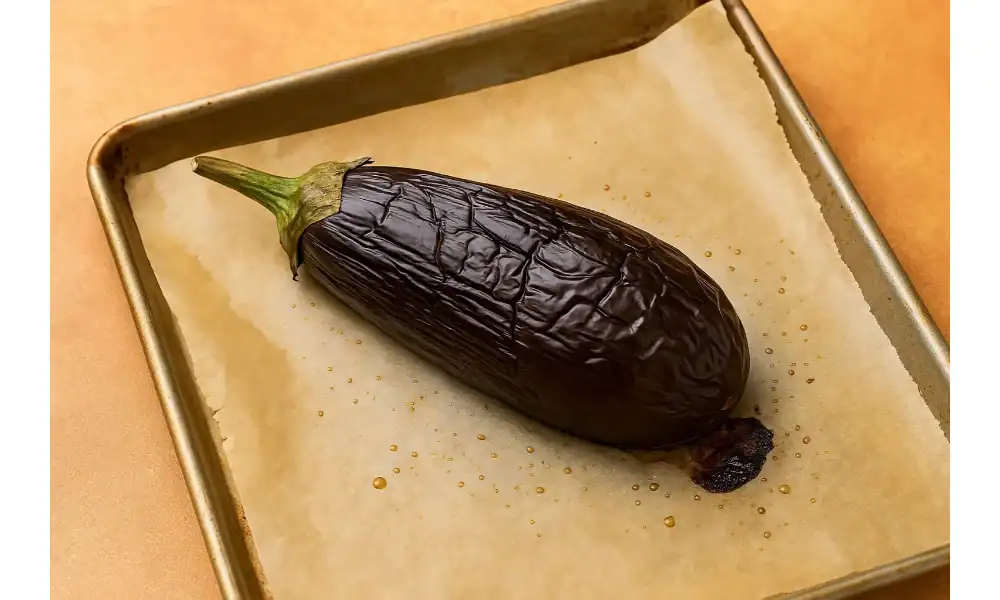Introduction
Roasting whole eggplant is a game-changer. It gives the eggplant a deep, smoky flavor you can’t get any other way. The inside turns soft and creamy, perfect for dips like baba ganoush or moutabal. You don’t need to peel or slice—just roast it as it is. This method is easy, healthy, and needs almost no prep.
Whether you’re making a dip, a spread, or a roasted veggie dish, this technique works every time. You’ll learn how to roast whole eggplant in the oven, what temperature to use, how long to bake it, and tips for getting the best results. Keep reading to master the oven-roasted eggplant method like a pro.
If you are an eggplant lover, try this:
- Best Ever Baked Eggplant Parmesan – Simple Step-by-Step Guide
- How to Make the Best Mediterranean Roasted Eggplant at Home
- Top 15 Eggplant Recipes You’ll Want to Make Again and Again
- Stardew Valley Cooking: How to Make the Perfect Eggplant Parmesan
- Gluten-Free Eggplant Parmesan Recipe – Comfort Food Made Healthy
H2: Why Roast Eggplant Whole?
Preserves Moisture
Roasting whole eggplant helps keep it juicy inside. Unlike slices, it doesn’t dry out. The skin locks in all the moisture while it bakes.
Boosts Flavor
Whole roasted eggplant has a deep, smoky taste. The heat brings out its natural richness. It adds bold flavor to any dish.
No Peeling Required
You don’t need to peel it before cooking. Once roasted, the skin loosens and the flesh gets soft. Just scoop it out and use it.
Ideal for Dips and Spreads
Use the roasted eggplant for baba ganoush, moutabal, or eggplant hummus. Its soft texture blends perfectly into creamy dips.
Healthier Method
Roasting in the oven means no frying. You don’t need much oil. It’s a clean and healthy way to cook eggplant at home.
Ingredients & Tools You’ll Need
Whole Eggplants
Pick medium to large eggplants. They should feel firm and look shiny. Avoid any with soft spots or wrinkled skin.
Olive Oil
This is optional. You can brush or drizzle a little on the skin before roasting. It adds a touch of flavor and helps with browning.
Kosher Salt
Use a pinch of kosher salt to bring out the eggplant’s natural taste. You can add it before or after roasting.
Baking Sheet
Line a baking sheet with foil or parchment paper. It makes cleanup quick and keeps the eggplant from sticking.
Sharp Knife or Fork
Use a knife or fork to poke a few holes in the eggplant. This helps steam escape and lets you test when it’s soft and done.
Step-by-Step Guide to Roasting Whole Eggplant in Oven

Step 1: Prep Your Eggplant
Wash the eggplant under cold water. Dry it with a clean towel. Use a fork to poke a few holes in the skin. This helps steam escape while roasting.
Step 2: Preheat Oven
Set your oven to 400°F (200°C). Let it heat fully before placing the eggplant inside. A hot oven gives you better results.
Step 3: Roast
Place the eggplant on a baking sheet. Don’t slice or peel it. Roast for 35 to 45 minutes. The skin should darken and wrinkle as it cooks.
Step 4: Check Doneness
Pierce the eggplant with a fork. The skin should collapse, and the inside should feel soft. If it’s still firm, give it a few more minutes.
Step 5: Cool and Scoop
Take it out of the oven and let it cool for 5–10 minutes. Then slice it open and scoop out the tender flesh. Now it’s ready for dips or any eggplant recipe you love.
Tips for Perfect Roasted Eggplant

Choose Eggplants with Tight, Glossy Skin
Pick eggplants that look shiny and feel firm. Avoid ones with wrinkles or soft spots. Fresh eggplants roast better and taste richer.
Roast Until Completely Collapsed
Don’t rush the process. Roast until the eggplant sinks in and the skin looks shriveled. This gives you that soft, smoky texture inside.
Flip Halfway Through
Turn the eggplant over halfway through cooking. This helps it cook evenly and adds more char for flavor.
Add a Foil Tent (Optional)
If the skin starts to burn too much, loosely cover the eggplant with foil. It protects the surface while letting the inside roast.
Let It Cool Before Peeling
Wait until the roasted eggplant cools down. It makes peeling easier and keeps your hands safe from heat.
Serving Ideas & Recipes Using Roasted Eggplant
Baba Ganoush
Blend the roasted eggplant with tahini, garlic, lemon juice, and a pinch of salt. This classic dip is creamy, smoky, and full of flavor.
Mediterranean Bowls
Add chunks of roasted eggplant to rice, quinoa, or couscous bowls. Mix with fresh veggies, feta, and a drizzle of olive oil for a balanced meal.
Eggplant Spread
Mash the pulp with Greek yogurt, garlic, and chopped herbs. Spread it over toast, crackers, or flatbread for a quick and healthy snack.
Pasta Dishes
Stir the soft eggplant into tomato sauce or use it in baked pasta. It adds a rich, meaty texture without needing any meat.
Roasted Veggie Platters
Pair the roasted eggplant with hummus, pita bread, olives, and grilled vegetables. It’s perfect for a light lunch or a party spread.
Roasted Eggplant Spread

Roasted Eggplant Spread
Ingredients
Method
- Preheat oven to 400°F (200°C).
- Wash and dry eggplants. Pierce them a few times with a fork.
- Place on a baking sheet and roast for 35–40 minutes, turning halfway, until soft and collapsed.
- Let cool slightly, then cut open and scoop out the flesh.
- Place flesh in a bowl. Add olive oil, garlic, lemon juice, tahini (if using), salt, and pepper.
- Mash with a fork or blend until smooth.
- Garnish with parsley and serve with bread, crackers, or veggies.
FAQS
1. What temperature should I use to roast whole eggplant in the oven?
Roast at 400°F (200°C) for the best texture and smoky flavor.
2. How long does it take to roast a whole eggplant?
It usually takes 35 to 45 minutes, depending on the size of the eggplant.
3. Do I need to peel the eggplant before roasting?
No, you roast it with the skin on. After cooking, you can scoop out the soft flesh easily.
4. Should I poke holes in the eggplant before roasting?
Yes, always poke a few holes with a fork. This allows steam to escape and prevents splitting.
6. How do I know when the eggplant is done?
The eggplant is ready when the skin looks collapsed and the inside feels very soft when pierced.
Conclusion
Roasting whole eggplant in the oven is simple, healthy, and full of flavor. You don’t need much prep, and the result is soft, smoky, and ready for so many dishes. Try it in a dip, a pasta sauce, or a veggie bowl.
Get creative with how you use it. The more you try, the more you’ll love it. Share your roasted eggplant creations or questions in the comments below.
If you found this guide helpful, bookmark it or pin it for later. You’ll always have the perfect roasted eggplant method at your fingertips.
For more recipes, try our:
- How to Make the Best Black Bean and Corn Salad (Quick & Easy)
- How to Make Authentic Mexican Street Corn (Elote) at Home
- How to Make Creamy Potato Grits from Scratch: A Southern Favorite
- 10 Easy Zucchini Recipes You’ll Want to Make All Summer Long
- How to Make Zucchini Fritters That Are Golden, Crispy, and Delicious


1 thought on “How to Roast Whole Eggplant Like a Pro – Oven Method”